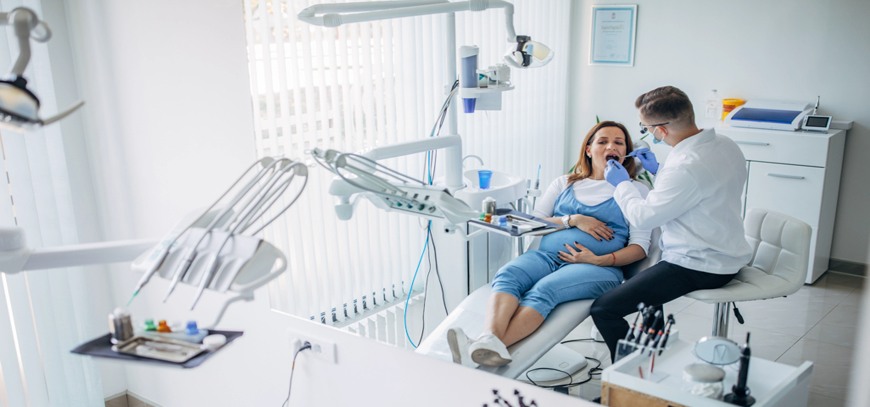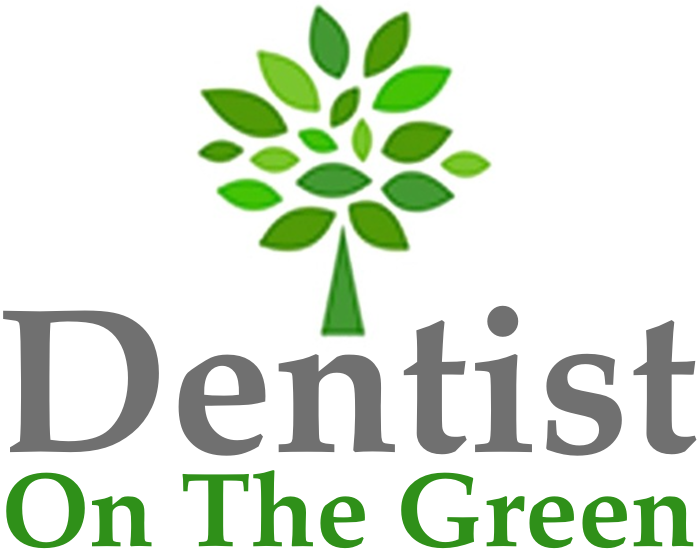Pregnant Women

Pregnancy can be an exciting time and while you have so much to plan for, your oral health may be one of the last things you’re thinking about. But it’s more important than ever to pay close attention to your dental health in this time.
That’s because hormone changes during pregnancy can affect your oral health and many pregnant women notice that their gums are red, inflamed and sometimes bleed when they brush their teeth. The swelling and inflamed gums are referred to as ‘pregnancy gingivitis’ and can start as soon as the second month of pregnancy. The hormone progesterone can be around 10 times higher than normal during pregnancy, affecting the body’s response to toxins as a result of plaque build-up. Women are therefore more susceptible to developing periodontal disease when these hormonal fluctuations occur.
Some women also experience a growth on their gums known as a pregnancy granuloma which are red nodules, usually found on the upper gums. While they are not dangerous, they can cause discomfort. Other oral health problems may include tooth erosion as a result of constant exposure to acid from severe morning sickness. Dry mouth is another major complaint, but can be easily remedied by drinking plenty of water and using sugarless candies to stimulate saliva flow.
If you are pregnant we recommend that you come to the practice for a thorough check up so we can help you to have a healthy and happy pregnancy.
Reasons why oral care is important during pregnancy
Oral care is especially important during pregnancy for several reasons:
-
-
- Frequent eating
-
During pregnancy, women are likely to eat and drink more frequently throughout the day. And with the more frequent sugar intake comes an increased risk for cavities, so it’s especially important to stick with a sound tooth brushing and flossing routine.
-
-
- Hormonal changes
-
Some women may be more likely to develop red, puffy gums during pregnancy because the additional amount of the hormone progesterone in the body causes a strong reaction to normal amounts of plaque. If your gums are especially sensitive, try a soft floss that slides easily and comfortably between teeth or a specialty interdental cleaning tool.
-
-
- Radiation avoidance
-
Although some pregnant women may have a dental emergency that requires a dental x-ray, taking good care of your teeth during pregnancy reduces the odds that you will need dental x-rays, and you can avoid exposing your baby to radiation. But if you do need x-rays, don’t panic. Your dental professional will minimize your exposure by having you wear a leaded apron and leaded band around your neck to protect your thyroid.
When to tell the dentist you're pregnant
Even if you only think you might be pregnant, let your dental office know. Tell your dentist how far along you are when you make your appointment. Also let your dentist know about the medications you are taking or if you have received any special advice from your physician. If your pregnancy is high-risk or if you have certain medical conditions, your dentist and your physician may recommend that some treatments be postponed.
-
-
-
-
-
-
-
-
-
-
-
- Don’t skip the dentist during pregnancy.
Following a consistent oral health care routine is especially important for pregnant women for several reasons. Pregnancy changes the hormones in the body that put pregnant women at increased risk for periodontal disease, which is the most severe form of gum disease. This is why pregnant women, or women who are considering pregnancy, should see a dentist for regular check-ups to catch any potential oral care problems before they become severe.In fact, regular dental check-ups are recommended in order to help manage plaque build-ups and to identify and treat mild cases of tooth decay or gingivitis before they become severe.
- Telling the dentist as soon as possible.As soon as you believe you’re pregnant, tell your dentist, because it may not be safe to have X-rays during pregnancy. You should also let your dentist know if you are trying to get pregnant; knowing this can help in planning x-rays or other treatments. Be sure to tell your dentist what medicines you’re taking and if your physician has given you any specific medical advice, as it may affect the treatment he or she recommends.When possible, visit your dentist before pregnancy so you can take are of any pre-existing dental problems before you conceive.
- Postponing dental care during your first trimester.The first trimester of your pregnancy (the first 13 weeks) is the time in which most of the baby’s major organs develop. If you go to the dentist during your first trimester, tell your dentist that you’re pregnant and have only a check-up and routine cleaning. If possible, postpone any major dental work until after the first trimester. However, if you have a dental emergency, don’t wait! Infections in the mouth can be harmful to you and your baby. See your dentist immediately, and make sure that all dental professionals who examine you are aware you’re pregnant.
- Visiting the dentist during pregnancy.
If you have postponed seeing your dentist during your first or second trimester, the third trimester is the time to have a dental check-up to ensure that your mouth is healthy. By visiting your dentist at this time, he or she will be able to advise you on what you can do to prevent oral health problems after your baby is born.
Filling placement is necessary to treat cavities and prolong the longevity of the natural teeth. With today’s technology continuously improving, new methods are developed to benefit the patients and ensure their positive oral health for a lifetime.
- Don’t skip the dentist during pregnancy.
-
-
-
-
-
-
-
-
-
-
Modern digital radiography has made radiation concerns almost negligible. X-rays for the diagnosis of dental disease during pregnancy are of very little risk to the developing fetus – especially when you consider the infections and pain that can develop if you don’t have them. However, it’s important that you tell your dentist you are pregnant before X-rays are done so the staff can provide a special garment or device to shield your pelvis and abdomen from exposure.
Hormone changes and certain medications can increase the risk of periodontal disease and dry mouth, so we advise patients to brush and floss twice daily during pregnancy. That might sound like a lot, but it can prevent cavities after eating craved sweets and reduce the risk of gum erosion. Also, vomiting related to severe morning sickness can cause acid erosion of the teeth and, rarely, pregnancy hormones can cause benign growths in the mouth that are not necessarily dangerous but can be annoying.
Additionally, a baby’s teeth start to develop during the third to sixth month of pregnancy. It is important that pregnant women monitor their diets to support healthy teeth in their babies. Pregnant patients might have a hard time brushing due to a strong gag reflex. Patients can try using a smaller toothbrush or using different flavors of toothpaste to make brushing easier.
After childbirth, continuing with your own dental care and your baby’s is very important. Continue brushing your teeth regularly and purchase an infant toothbrush and infant toothpaste without fluoride to keep the baby’s gums and budding teeth healthy. We also advise new parents to avoid putting babies to bed with bottles because it can lead to tooth decay.
Schedule your baby’s first dentist appointment at six months or when the first tooth comes in. The dentist will check for tongue-tie and other oral issues that can delay speech and other functions. Also, seeing a dentist regularly will help the baby get used to it and potentially reduce the fear of seeing a dentist later in life. Remember, good dental health is key to overall wellness, and pregnancy is an optimal time to establish healthy habits.
